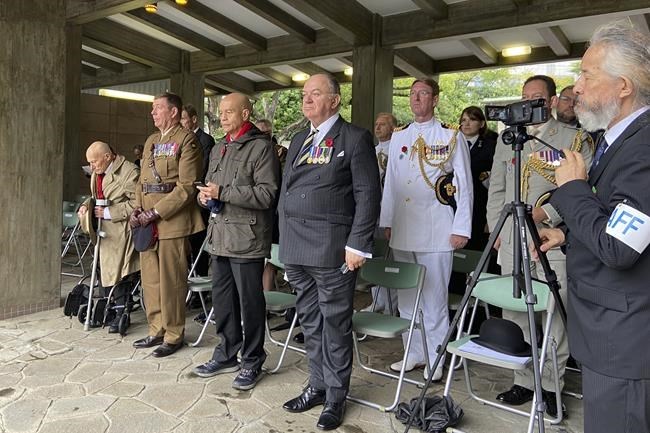
Richard Day, far left, a British army veteran who survived the Burma Campaign, and relatives of other veterans attend a memorial at the Chidorigafuchi National Cemetery in Tokyo, Monday, Oct. 9, 2023. The memorial was attended by military officials from the embassies of several former allied nations, including Australia, Britain, New Zealand and the U.S. at the cemetery for the unknown Japanese who died overseas during the war. (AP Photo/Mari Yamaguchi)
October 09, 2023 - 6:22 AM
TOKYO (AP) — A British army veteran who fought and survived one of his country's harshest battles known as the Burma Campaign against the Japanese during World War II traveled to Japan to lay flowers at the tomb of the Unknown Soldier at a memorial ceremony on Monday to stress the importance of reconciliation.
Richard Day, 97, who survived the decisive 1944 Battle of Kohima in northeast India — where Japan fought to capture the then British-controlled territory — stood up from a wheelchair, placed a wreath of red flowers on a table and saluted the souls of the unknown Japanese soldiers at Tokyo's Cihdorigafuchi National Cemetery.
“It was very moving, but it brought back some terrible memories,” Day said after the ceremony. When he was laying flowers, he said, “I was remembering the screams of people ... they were crying out after their mothers.”
He shook hands at the memorial and later conversed with relatives of the Japanese veterans who also attended the event.
“You can’t carry hate," Day said. “(Otherwise) You are not hating each other, you are hurting yourself.”
Day was in his late teens when he was sent to the notoriously severe battle, where he also faced harsh conditions, including contracting malaria and dysentery simultaneously while fighting the Japanese.
About 160,000 Japanese were killed during the battle, many from starvation and illnesses due to insufficient supplies and planning.
Some 50,000 British and Commonwealth troops were also killed, nearly half of whom perished in brutal prison camps. Hard feelings toward Japan’s brutal treatment of prisoners of war remained in Britain years after the fighting ended.
Yukihiko Torikai, a Tokai University professor of humanities and culture came on behalf of his grandfather Tsuneo Torikai who returned from the campaign alive after his supervisor ordered a withdrawal.
The university professor shook hands with Day, expressing his appreciation of the British veteran’s trip to Japan. He later said he is aware not everyone is ready for reconciliation and that it would have been even better if a Japanese veteran who survived the battle could come.
“As we foster friendship, it is important to remember the past, not just putting it behind,” Torikai said.
Military officials from the embassies in Tokyo of former allied countries, including the United States, New Zealand and Australia attended the ceremony.
Event organizer Akiko Macdonald, the daughter of a Japanese veteran who also survived the Battle of Kohima and now heads the London-based Burma Campaign Society, said the joint memorial in Japan for those lost in the battles of Kohima and Imphal was especially meaningful.
Day was also set to visit and pray at Yokohama War Cemetary, where many of the buried were POWs, as well as Yamagata, Hiroshima. He also wanted to visit Kyoto to find the hotel where he stayed while on postwar duties to thank them for their hospitality.
News from © The Associated Press, 2023